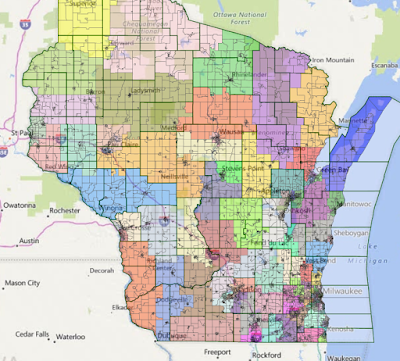Well, it looked like that idea might be starting to pick up some steam, and it could mean that we are finally seeing some progress with the state’s stalled budget talks. Assembly Speaker Robbin’ Vos told reporters yesterday that Assembly GOPs were in favor of the truck fee, and that Senate GOP Leader Scott Fitzgerald may allow for some kind of per-mile fee to be discussed in his caucus after initially saying it was a “nonstarter.”
Vos indicated that the truck fee, which could bring in $250 million over two years, was one of the "potential pieces" to solving the budget impasse. It could be temporary and be replaced in a few years by money generated from toll roads, if the Legislature endorses that idea, Vos said.But within one day, that idea seems to be going up in smoke, as 5 Republican Senators put out a statement saying that they won't support an increase in truck fees ...or pretty much any fee or tax increase.
"I'm optimistic the Assembly is aligned with Gov. Walker and we feel very good that we have the ability to get to an answer that we can pass and hopefully he can sign," Vos said.
Walker spokesman Tom Evenson did not immediately return a message asking whether the governor would support the truck fee.
Assembly Republicans have insisted on raising revenue as part of the plan to solve a $1 billion shortfall in the transportation budget, the biggest road block to reaching a budget deal. Walker proposed $500 million in new borrowing and Senate Republicans back $850 million more in borrowing.
As the budget debate lingers, it remains clear that some in the legislature are seeking to increase WisDOT taxes in any way possible. The recent audit of WisDOT shows there are many reasons the agency has been inefficient and does not deserve new revenues. We should be looking for savings in government.Look, if you're ideologically opposed to paying taxes to fix the roads (or pretty much anything), I can see where you might want to stick to it. And perhaps there is truth in that we don't need all of these expensive highway projects, including I-94 East-West in the Milwaukee area.
The “tax of the week” is a new tax on trucking Instead of getting creative to find new ways to tax Wisconsinites, we should be discussing the reforms needed to clean up an agency with a record of over-designing, over-building, and over-paying for our roads. If the state were to add a new tax, Wisconsin’s tax rankings will go in the wrong direction.
Throughout the budget process, we have been discussing the elimination of taxes like the state forestry mill tax and the personal property tax on Main Street. Now is not the time to increase taxes on our citizens.
But otherwise this criticism from the 5 GOP Senators is absurd (the 5 are Stroebel, Kapenga, Lasee, Craig and Nass, a group that is truly the dumbest of asses). If you go back to that January audit of DOT, the problem was that costs were UNDERestimated by the DOT and not enough money was set aside in the budget, more than overspending on the projects themselves.
And it's prior GOP tax-cutting decisions such as giveaways to the rich and corporate and a refusal to raise revenue that have restricted the ability to pay for the roads without raising taxes or fees. Now add in 2017-19 budget gimmicks such as dumping the personal property tax and state forestry tax, and the 5 WisGOP Senators would be giving up a total of $700 million that could have been used for the roads or other needs in this budget, without having to raise a single tax or fee. But God forbid someone pay $25 more on their property tax.
The $250 million that would be raised by the proposed heavy truck fee wouldn’t be enough to get rid of all borrowing for highways in this budget, but it would cut it in half. Combined with an extra $93 million that is projected for the Transportation Fund over the next 2 years, this would at least give a bit of cushion or allow for extra work in this biennium.
However, $250 million every 2 years doesn’t equal the $1 billion in additional funds we would likely need for the 2019-21 budget just to keep up with the state’s highway needs. And the line about tolling from Vos begs the question as to whether tolls would be part of any transportation deal in this budget. If so, the extra money going in from the fee on trucks merely offset the estimated $400 million cost to set up the tolling system.
And now that the gang of 5 GOP Senators has said they won't support the truck fee, that proposal may be dead in the upper house, because that only leaves 15 Republican Senators that could even consider voting for it, and 17 votes are needed to pass things in the Senate. The only way anything can get through with 5 GOPs voting "no" in the Senate is if Democrats could vote for the bill, but I feel safe in saying 0 Dems will vote for the full budget, no matter how it ends up.
Which means there are 2 options left to try to get a deal on DOT funding and the rest of the budget in place.
1. Do Transportation as a separate issue from the rest of the budget, and find some revenue compromise that gets enough bipartisan support to sneak through.
2. Go back to the drawing board, which means more delays on the full budget, which is already overdue as of tomorrow.

Yeah, I think we're going to be stuck here a while...

















